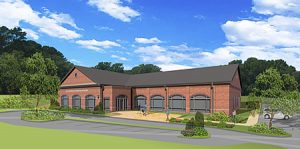ECU to build dental center at Davidson County Community College
THOMASVILLE, N.C. (June 1, 2012) — The Triad will soon be home to a facility that officials say will bring dental care to low-income underserved residents while providing educational opportunities to East Carolina University dental students.
That was the message today as leaders of Davidson County Community College and the ECU School of Dental Medicine announced plans to build a “community service learning center” on the DCCC campus.

Dr. Gregory Chadwick, interim dean of the ECU School of Dental Medicine, speaks at Davidson County Community College on Friday, June 1. Photos by Cliff Hollis
ECU will build the facility on land donated by DCCC. The Davidson County Health Department has also been a partner on the project. Construction dates will be announced later.
At the center, the sixth ECU has announced since it began its new dental school in 2008, fourth-year dental students and dental residents will hone their patient-care techniques and learn the ins-and-outs of operating a community practice under the eyes of experienced faculty members.
The $3 million, 8,000-square-foot center is one of up to 10 ECU plans to build across the state. The first center is scheduled to open in Ahoskie later this month. Others are planned for Elizabeth City in eastern North Carolina, Lillington in the central part of the state, and Sylva and Spruce Pine in the mountains.
“We are very excited about our partnership with Davidson County Community College, the county health department and the local dental community and look forward to providing quality dental care to residents of Davidson and the surrounding counties,” said Dr. Gregory Chadwick, interim dean of the School of Dental Medicine at ECU.
Mary Rittling, president of DCCC, said she’s excited about the partnership with ECU. “At DCCC, we are truly a central gathering place for the county, and we look forward to offering yet one more service to the community,” she said. “‘Community’ is the most important part of our name, and this dental clinic epitomizes our mission to serve the people of this region.”
The center will have 16 dental chairs and will employ local staff members, including 1.5 full-time dental faculty positions, a business manager, five to six dental assistants, two to three dental hygienists and two general dentistry residents. Four to five students will be at the center for nine-week rotations.
Once open, the center will provide a variety of services, including general, preventive and emergency dental care and will include services such as crowns, root canals and bridges.
The setting will provide students and dental residents with an opportunity to learn what practicing in a community setting is like. The school admitted its first class in 2011, and all students are North Carolina residents. Goals of the school are to improve access to dental care, to educate minority dentists and to produce dentists who have a desire to practice in underserved areas.
“The ECU approach – educating students and residents in our community service learning centers – could become a future model for dental education,” Chadwick said. “Community service learning centers are more than just dental clinics. They are an integral part of our dental school where our seniors will spend much of their fourth year.”
North Carolina ranks 47th out of the 50 states in the number of dentists per capita, according to the Cecil G. Sheps Center for Health Services Research at the University of North Carolina at Chapel Hill. Many people without good dental care live in rural areas, where North Carolina averages three dentists for every 10,000 people. That compares to urban areas of the state, where the ratio is nearly five dentists for every 10,000 people. Four counties, all in the northeast, have no dentists: Gates, Tyrrell, Hyde and Camden.
Nationally, the ratio is six dentists for every 10,000 people.
Davidson County has fewer than 2.6 dentists for every 10,000 people, according to the Sheps Center. Several of the dentists are over 70 years old, and a few are in their 80s, said Dr. Mark Davis, a Lexington dentist, DCCC trustee and former chair of the Davidson County Board of Health. He said the center should help recruit new dentists to the area.
“We’re hoping as we get the (dental students and residents) here, we can get them to stay here,” Davis said.
ECU hopes the centers will help improve the status of dental health in the state while adding an innovative educational aspect to dental school.
“We’ve taken the fourth floor of the dental school – the senior year clinical area – we’ve stretched the wires and we’re moving that part of our dental school to communities across the state where dental services are needed,” Chadwick said. “We are not only providing much needed care, but we are also educating our future dentists in areas similar to where we hope they will practice.”
ECU dental student Diana Luckhardt of Summerfield in nearby Guilford County agreed that working in the centers will help broaden her dental education.
“If you don’t get out and experience it, you don’t see the need,” she said. Luckhardt added that working in the centers will help teach students how to operate a dental practice.
The center will be built on the main DCCC campus in Thomasville. Construction will be paid for with funds appropriated by the state to ECU. Additionally, the CSLCs will generate revenue through patient care each of the centers will provide.
Founded in 1963, Davidson County Community College offers studies in more than 50 degree programs.

ECU dental student Diana Luckhardt speaks about how the community service learning centers will broaden her dental education.

Here is an architectural rendering of the community service learning center ECU will build in Thomasville. Image courtesy ECU School of Dental Medicine